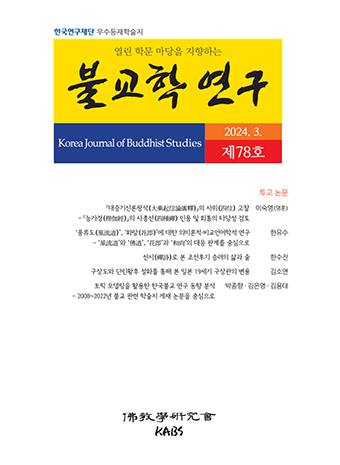Abstract
References
Sorry, not available.
Click the PDF button.
Information
Jacques Derrida (1930~2004) is in the front line of postmodernistic challenges and deconstruction philosophy which is his main ideology. Derrida's deconstructionism is the deconstruction of the absolute from the center and in the center of the subject of which must be deconstructed is the absolute, modern self-definition which has the aspects of uniformity and standardization. Joanna Macy criticized modern self-definition in her thesis "The Ecological Self: Postmodern Ground for Right Action" and advocates ecological self with a postmodernistic vision. She uses the modernistic self-concept in the same context with Buddhist self denial and moreover, she advocates ecological self-understanding based on Buddhist non-self and dependent origination. She also makes it clear that the ecological self-understanding and its practical model that she has suggested are based on postmodernism. Hence, it has been verified that eco-Buddhism uses the same grammar with postmodernistic ecology.Macy's ecological self-theory can only be in the same context with Buddhist bodhisattva. Her theory concludes with an action plan while in Buddhism the Buddhist self-denial can only be concluded with its practical usage of the bodhi's charity performance. The ecological practices as an ethical duty based on modern self-concept can only draw a line of demarcation between oneself and others and eventually can not function as a complete ecological idealism. Therefore, Macy emphasizes the best alternative solution for the current ecological crisis, which is to take action based on the ecological self-understanding that takes the same stance as Buddhist self-denial, dependent origination and bodhisattva.
포스트모던적 도전의 선봉에 데리다(Derrida, Jacques, 1930~2004)가 있으며 그의 중심사상을 해체철학이라 부른다. 데리다의 해체주의는 중심으로서의 절대의 해체이며 그 해체되어야 할 대상의 중심에 절대와 획일과 보편적 성격을 갖는 근대적 자아개념이 자리 잡고 있다.조안나 메이시(Joanna Macy)는 자신의 논문 “생태학적 자아: 올바른 실천을 위한 포스트모던적 기반”에서 이 근대적 자아개념을 비판하고 포스트모던적 비전으로서 생태학적 자아를 주창한다.메이시는 불교의 자아부정과 동일한 논리체계로써 근대적 자아의 개념을 용도폐기하고, 나아가 불교의 무아설과 연기법에 근거한 생태학적 자아이해를 주창한다. 또한 자신이 제시한 생태학적 자아이해와 그 실천적 모형이 포스트모더니즘에 근거하고 있음도 명백히 한다. 이로써 생태불교학은 포스트모던적 생태학과 그 논리체계를 같이 하고 있음이 확인된다. 메이시의 생태학적 자아이론은 불교의 보살론과 맥을 같이 할 수밖에 없다. 조안나 메이시의 이론은 실천으로 결론을 삼고 있으며 불교의 자아부정은 그것의 실천인 보살의 자비행으로 결론지을 수밖에 없기 때문이다.근대적 자아개념에 근거한 윤리적 의무로서의 생태적 실천은 자타의 분립을 피할 수 없으며, 이는 결코 온전한 생태적 이상으로 기능할 수 없다. 따라서 메이시는 불교의 자아부정, 연기법 및 보살론과 맥을 같이하는 생태학적 자아이해와 이에 근거한 실천만이 오늘의 생태위기에 대한 최선의 대안임을 역설한다.
Click the PDF button.
- Publisher :Korean Association of Buddhist Studies
- Publisher(Ko) :불교학연구회
- Journal Title :Korea Journal of Buddhist Studies
- Journal Title(Ko) :불교학연구
- Volume : 15
- No :0
- Pages :331~365


 Korea Journal of Buddhist Studies
Korea Journal of Buddhist Studies






